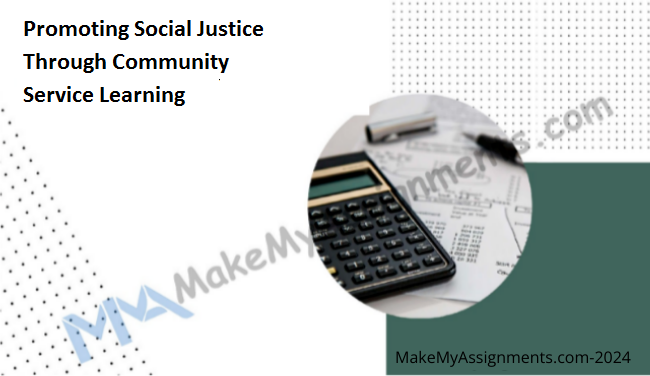
Promoting Social Justice Through Community Service Learning
In a world where social justice issues persist, fostering meaningful change often requires more than just awareness or advocacy—it requires action. Community service learning (CSL) emerges as a powerful tool in this pursuit, blending academic learning with hands-on community engagement. By integrating real-world experiences with classroom education, CSL not only enhances academic understanding but also cultivates empathy, civic responsibility, and a commitment to social justice. In this blog, we delve into the significance of promoting social justice through community service learning, exploring its benefits, challenges, and effective strategies.

Understanding Community Service Learning: Community service learning, often referred to as service learning or experiential learning, is an educational approach that combines academic instruction with meaningful community service. Unlike traditional classroom learning, CSL emphasizes practical application, encouraging students to address real societal issues through collaborative projects with community partners. Whether it’s tutoring underserved students, advocating for environmental sustainability, or assisting marginalized populations, CSL provides students with opportunities to apply theoretical knowledge in practical contexts, fostering a deeper understanding of social justice issues.
Benefits of Community Service Learning in Promoting Social Justice:
- Experiential Learning: CSL offers hands-on experiences that allow students to witness social injustices firsthand, fostering empathy and a deeper understanding of systemic issues.
- Civic Engagement: Engaging in community service cultivates a sense of civic responsibility and empowers students to become active participants in addressing societal inequalities.
- Collaboration and Networking: CSL projects often involve collaboration with community organizations, fostering partnerships that can lead to sustainable social change.
- Personal Growth: Through reflection and self-assessment, CSL encourages personal growth, promoting critical thinking, empathy, and cultural humility.
- Long-Term Impact: By instilling a commitment to social justice early on, CSL can inspire lifelong activism and advocacy among students, contributing to long-term societal change.
Challenges and Considerations: While community service learning holds immense potential for promoting social justice, it is not without challenges. Some of the key considerations include:
- Power Dynamics: Addressing power imbalances between students and community partners is essential to ensure equitable partnerships and meaningful collaboration.
- Sustainability: Maintaining long-term engagement and impact beyond the duration of a course or program requires careful planning and ongoing support.
- Intersectionality: Recognizing the intersecting nature of social justice issues, CSL should strive to address multiple dimensions of oppression and privilege.
- Ethical Considerations: Ensuring that CSL projects respect the dignity and autonomy of the communities served is crucial, requiring ethical reflection and accountability.
- Institutional Support: Adequate institutional support, including funding, infrastructure, and faculty development, is essential for the successful implementation of CSL initiatives.
Strategies for Effective Implementation: To maximize the potential of community service learning in promoting social justice, educators and institutions can adopt the following strategies:
- Integrate Social Justice Frameworks: Incorporate social justice frameworks and theories into CSL curriculum design to provide students with conceptual tools for understanding and addressing systemic injustices.
- Foster Critical Reflection: Implement structured reflection activities that encourage students to critically analyze their experiences, values, and assumptions, fostering self-awareness and empathy.
- Prioritize Community Voice: Center the perspectives and priorities of community partners in the planning and implementation of CSL projects, ensuring that initiatives align with community needs and goals.
- Cultivate Partnerships: Build sustainable partnerships with community organizations, fostering reciprocal relationships based on trust, respect, and mutual benefit.
- Empower Student Leadership: Empower students to take ownership of their learning and activism, providing opportunities for leadership development and initiative.
In the pursuit of promoting social justice through community service learning (CSL), students often seek guidance and support to navigate the complexities of real-world engagement. MakeMyAssignments (MMA) emerges as a valuable ally, offering comprehensive assistance to students embarking on CSL initiatives. Through personalized guidance, resources, and academic support, MMA empowers students to maximize their impact, fostering meaningful change in their communities. In this section, we explore how MakeMyAssignments can support students in their CSL endeavors, enhancing learning outcomes and promoting social justice.
- Tailored Guidance and Consultation: MMA provides personalized guidance and consultation to students embarking on CSL projects. Experienced tutors and mentors offer insights, resources, and strategies to help students identify meaningful community partnerships, develop project proposals, and navigate ethical considerations. By leveraging MMA’s expertise, students can refine their project objectives, ensuring alignment with social justice principles and community needs.
- Academic Support and Resources: In addition to practical guidance, MMA offers academic support and resources to enhance students’ understanding of social justice issues and their intersection with community service. From literature reviews and research assistance to essay writing and presentation skills, MMA equips students with the academic tools necessary to critically analyze societal injustices and articulate their advocacy effectively. Through access to scholarly databases, educational materials, and online tutorials, students can deepen their knowledge and strengthen their arguments, amplifying the impact of their CSL projects.
- Reflective Practice and Self-Assessment: Central to the success of CSL initiatives is reflective practice and self-assessment. MMA facilitates this process by providing structured frameworks and prompts for students to critically reflect on their experiences, values, and learning outcomes. Through guided reflection exercises, students can explore the ethical dilemmas, power dynamics, and personal insights inherent in their engagement with communities. By fostering self-awareness and empathy, MMA empowers students to approach CSL projects with humility, sensitivity, and a commitment to continuous learning and growth.
- Collaborative Learning Communities: MMA cultivates collaborative learning communities where students can share experiences, exchange ideas, and support one another in their CSL endeavors. Through online forums, discussion groups, and peer mentoring programs, students can connect with like-minded peers, collaborate on projects, and draw inspiration from diverse perspectives. By fostering a sense of belonging and collective responsibility, MMA creates an inclusive space for students to explore social justice issues, challenge assumptions, and catalyze change together.
- Advocacy and Amplification: Beyond individual CSL projects, MMA encourages students to become advocates and ambassadors for social justice within their communities and beyond. Through workshops, seminars, and networking events, MMA provides platforms for students to amplify their voices, raise awareness about pressing social issues, and mobilize support for systemic change. By empowering students to become agents of change, MMA catalyzes a ripple effect of social transformation, extending the impact of CSL initiatives far beyond the classroom.
As students embark on their journey of promoting social justice through community service learning, MakeMyAssignments stands ready to support and empower them every step of the way. Through tailored guidance, academic support, reflective practice, collaborative learning communities, and advocacy opportunities, MMA equips students with the tools, resources, and inspiration they need to make a meaningful difference in their communities. By partnering with MakeMyAssignments, students can turn their passion for social justice into action, transforming their academic learning into real-world impact and paving the way for a more just and equitable society.



